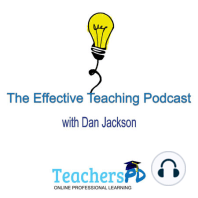10 min listen
Episode 29 Cognitive Load
ratings:
Length:
15 minutes
Released:
Feb 5, 2020
Format:
Podcast episode
Description
In this episode, Dan explains what cognitive load is and how it can be leveraged to increase the student learning in your lessons. Cognitive Load is licensed under a Creative Commons Attribution-NonCommercial-ShareAlike 4.0 International License.Join the Facebook CommunityWhat is Cognitive Load?Cognitive load is the theory that your working memory has a limited capacity. This limit varies according to you level of expertise in the subject being examined with an expert able to handle up to eight items and a novice only able to manage four. Your working memory is also limited in time. You can generally only handle these separate items for around fifteen seconds before your memory does a refresh of the items. There are three different types of load when it comes to learning. The Intrinsic load, the germane load and the extraneous load. The intrinsic load is the load that comes with the content itself. Some learning is harder than others because it is more complex or is new content. The germane load is the load that comes with what you need to do with the items. This is the work of learning. For example, if you were asked to describe something this has a fairly low load compared to providing a critical analysis of it. The extraneous load is all about the way the items are presented. If the presentation is cluttered then the load increases but if the presentation is clean and precise it helps to reduce the load.As a teacher you want to reduce the extraneous load as much as possible, the intrinsic load cannot be changed and we should be looking to progress the germane load as the learner becomes more familiar with the items.Teaching Strategies that can help reduce cognitive loadBe selective when you present new information or skills. Keep the key points and ideas, remove anything that is not needed, and spend less time on tangents. Clean up your presentations and teaching and learning area to help reduce the extraneous load.Make sure your students have everything they need to complete a task. If they need something from a previous lesson or are trying to bring multiple aspects of a puzzle together, provide them with a chart or brief summary that they can glance at when they need to. This will help reduce their need to remember items when doing higher order thinking.Chunk the items into related clusters. Our brain does this to store the information, so if it is presented in this way it makes the storing much easier as well as the recalling. Along with this is to ensure you present foundation knowledge and skills and build upon this, rather than simply providing the information in the order of the syllabus or some other format that has not been well thought through.Draw attention to key pieces of information as I have in this section by making the strategies bold. If something is key, foundational or built upon at a later date, make sure the students know this. You can do this by slowing down, repeating key elements or literally highlighting it.Use mnemonics and acronyms to help students store information. Provide pegs from which further information can be drawn. Another great tool is the use of visual walk throughs. Recall as you enter your house and put key items related to what needs to be remembered throughout your visual house that help you recall the information you need to then expand on what you know.Getting students to work collaboratively in groups also helps reduce the cognitive load. Students benefit from sharing the load of remembering the items and therefore can use more items in their learning. You need to make sure the task has multiple items though to ensure all students are needed to complete the task.You must know what your students know! What you can learn is dictated by what you already know. Students can only learn in their zone of proximal development, the learning that they can link to what they already know to go that step further towards the learning goals.
Released:
Feb 5, 2020
Format:
Podcast episode
Titles in the series (100)
Episode 25 Reaching Every Student with Jon Bergmann by Effective Teaching
